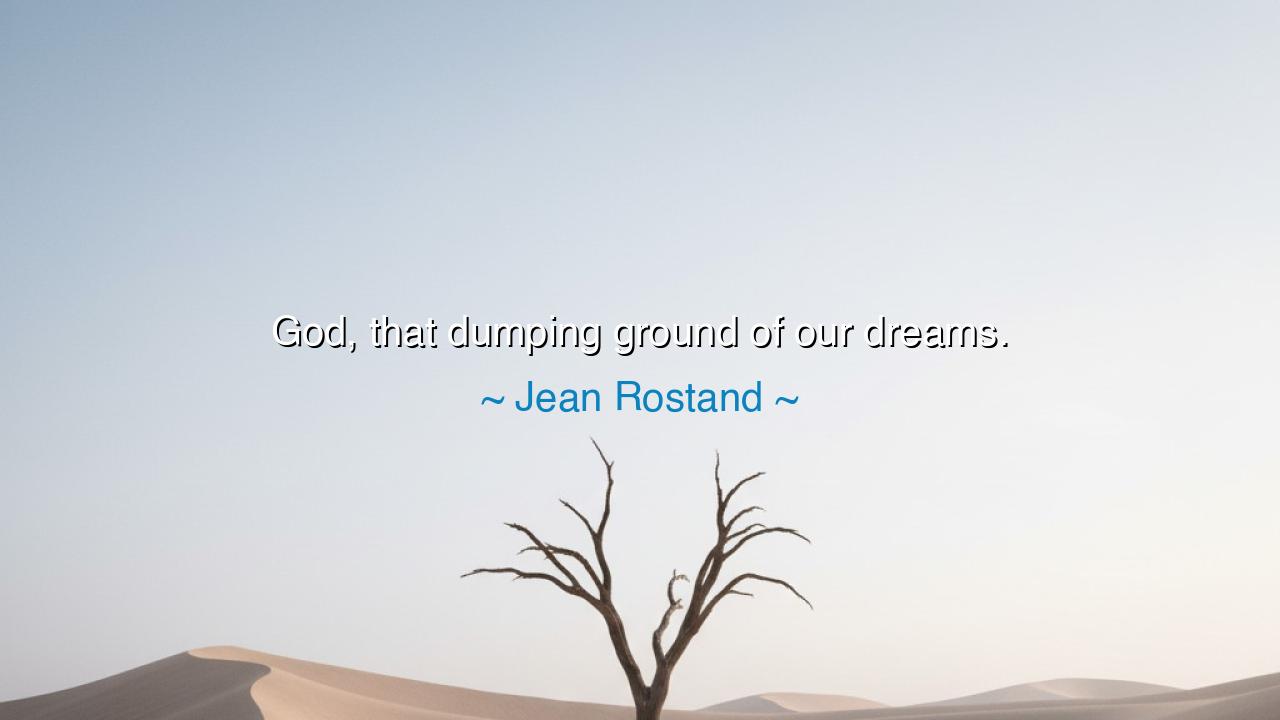
God, that dumping ground of our dreams.






When Jean Rostand wrote, “God, that dumping ground of our dreams,” he was not mocking the divine — he was exposing the eternal ache of humanity, the way we cast our deepest longings, our fears, and our failures into the heavens, hoping for solace or meaning. These words, sharp and mournful, are born from the heart of a scientist and philosopher who wrestled with both faith and reason, and saw in mankind’s relationship with God a mirror of its own restless desire. Rostand’s statement is not blasphemy; it is revelation — that in our pursuit of meaning, we have filled the idea of God with everything we cannot yet understand or accept within ourselves.
In the ancient sense, this idea is both tragic and profoundly human. From the dawn of civilization, man has sought to explain the mystery of existence — thunder was the voice of the gods, the stars their eyes, the storm their anger, the rainbow their forgiveness. In these myths, the divine became a vast canvas upon which humanity painted its dreams. We gave our hopes to heaven and our despair to prayer. We asked the skies for justice, for mercy, for love. And when those dreams were too heavy for us to bear, we laid them at the feet of the unseen. Rostand, living in the age of science, saw that this impulse had not changed. Even as we learned the language of the atom and the gene, we still sought something — someone — to carry the unbearable weight of our yearning.
Yet, there is tenderness in his tone. To call God the dumping ground of our dreams is to admit that dreams themselves are sacred burdens — too vast for any mortal vessel. When we say, “God will make it right,” or “God will answer,” we are expressing the deep human need for hope beyond reason. Rostand understood that in times of despair, humanity throws its broken dreams into the sky not out of laziness, but out of longing. We do not discard them; we offer them — like prayers, like fragments of our soul. And perhaps that is the paradox of his words: that in making God the repository of our unfulfilled dreams, we have, in a way, made Him the guardian of our deepest truths.
There have been many through history who have lived out this paradox. Consider Job, from the ancient scriptures — a man who, when stripped of everything, cast his rage, his confusion, and his sorrow toward God. He accused, questioned, and wept — and yet, in doing so, he kept his faith alive. His despair was not the denial of belief, but its truest form. He could not hold his pain alone; he had to throw it into the vastness of the divine. In this way, Job’s cry became the living embodiment of Rostand’s insight: that human beings turn to God not only for miracles, but to survive the unbearable weight of their dreams.
In a more modern age, we can see the same in the lives of those who turned their despair into creation — Vincent van Gogh, for instance, who painted his torment into the night sky. The swirling stars of The Starry Night are not mere lights — they are his dreams, his prayers, his questions, thrown into the vast blue infinity. Whether he believed in God or not, he treated the heavens as a sanctuary for his dreams, much as Rostand described. For those who create, who struggle, who hope, the divine becomes the ultimate receptacle of meaning — the place where our unfinished songs and unanswered prayers go to rest.
But beneath the melancholy of Rostand’s words lies a deeper call to self-awareness. If we make God the “dumping ground” of our dreams, we risk forgetting that the divine spark lives also within us. The ancients taught that the gods dwell not only in temples or stars, but in the human heart. To send our dreams away to the heavens without acting upon them is to forget our own power. Rostand’s quote, though tinged with irony, challenges us to reclaim responsibility for our own creation — to understand that faith must be matched with effort, that prayer must walk hand-in-hand with purpose.
The lesson, then, is this: do not only throw your dreams into the sky — build them upon the earth. It is noble to believe that the divine hears you, but it is wiser to act as though you are its instrument. Dream, yes, but also do. Pray, but also build. For the truest honor you can give to God — or to whatever you call the sacred — is not to leave your dreams abandoned in the ether, but to shape them with your own hands, as co-creator of your destiny.
And yet, even as we build, we may still look upward, for that is the nature of the human soul — to lift its eyes toward something greater, to entrust what it cannot complete to something beyond comprehension. Jean Rostand’s words remind us that it is both our gift and our curse to dream beyond our reach. We are the creatures who imagine eternity while standing on mortal ground. So let us continue to dream, to strive, to hope — not because God must hold our dreams for us, but because in dreaming, we reveal that spark of the divine within ourselves.






AAdministratorAdministrator
Welcome, honored guests. Please leave a comment, we will respond soon